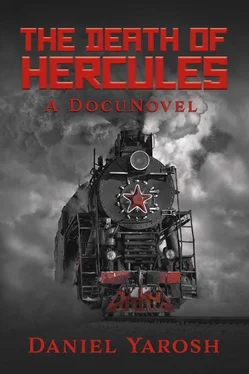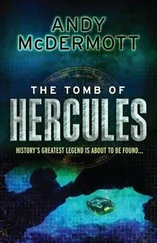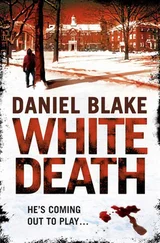Ignoring these reactions, Zalmund refilled his glass with wine and hoisted it again, with an enthusiasm that shocked the Jewish men. “To the victorious army! Our Volunteer Army! Long may they protect us!” he shouted.
“Yes, yes but wait a minute!” Hivitsky raised his hand. The Poles scrambled behind him to empty their wine and refill from the carafes of vodka. They all then turned to the Jews and said together “To the Army! Na Zdrowie !” They all drank, and the Poles immediately refilled their glasses with vodka. The Jews took more wine.
“To our Motherland and our Mother Church,” one young Pole sneered, and looked to see if the Jews would drink. Under a scowling glare from Zalmund, the Jews drank more wine, and the Poles followed by finishing their glasses. More vodka was poured and drank, and they descended on the table of food without waiting for the Jewish blessings. The eggs went first.
Altmann stood in the back with Zalmund, who was visibly perspiring and flushed. “You must talk to him again. Give him an amount, any amount, that he cannot refuse” Altman pleaded. From a few steps away, Vogelman rocked in the seat with his head in his hands.
“In a bit,” Zalmund said calmly, and rolled his eyes upward, flitted and then closed his lids.
The first Pole collapsed, dropping his plate of food on the carpet. Two others who had been talking with him laughed, then looked to the ceiling, buckled their knees and fell beside him. Three Poles drew their daggers but could not fix on the Jews. They wobbled and rushed forward. The Jews easily evaded the wild stabs, and they also fell. Hivitsky looked with astonishment at his men on the floor, then at Altmann, but his thoughts turned to his own stomach, and the vice that crushed his chest and the flames that burned his veins. He vomited and keeled over. The remaining Poles stumbled to come to his aid, but each succumbed, briefly squirming on the ground before expiring.
The Jewish men stood like stones, shocked in disbelief as the troop of uniformed Polish men lay dead at their feet. Mrs. Altmann and the maid rushed into the room, hands to their cheeks, in silent screams. “No, no, no…” one man said.
Zalmund opens his eyes and bent down to take the sword from Hivitsky’s belt. He then took Vogelman by each elbow, stood him up and stared straight into his eyes. “Go now and get your daughter. Take this to show them you have him. Leave everything you have behind. Go to your family in Beled. Tonight.”
He turned and waved to Deena and Max to join him in fleeing out the front door. They walk quickly across the open space next to the Great Synagogue, which now loomed over them in a mocking moral tone.
“We must be on the 10 pm train,” Zalmund told them.
Max stopped in astonishment at the magnitude of the massacre, and to consider what his role might be. They had each seen soldiers die before, crumpled on the ground, life cut short, for some small purpose. What had happened here?
“What have you done? They will come back and murder them all!” Max screamed out.
“How else should we deal with those who treat our sister as a whore?” Zalmund quoted calmly.
It wasn’t the Poles but the Germans who came to Katowice in 1939, and by 1941 there was no more Great Synagogue and no more Jews in the town.
Their escape from Katowice included a frantic dash to the boarding house to gather their bags, and a rush across the street to find the train headed east. Max barely had time to decide what he would say to Zalmund on their ride until they stood on the platform watching the Krakow bound train pull in. As his righteous anger swelled, Zalmund suddenly turned to Deena and explained, “when you get to Krakow, go to the Kazimierz district, to the Alte Shul and ask for Rabbi Jacob Slutsky. He will have a room for you for the night.”
“You’re not coming with us?” Deena implored.
“I’ll be there later, probably tomorrow,” Zalmund said. He did not even look at Max, then turned and shuffled across the station, clutching his coat and suitcase, to the military tracks at the far end of the terminal.
Max looked at Deena, astonished. “He’s going to the army side of the station. He will turn himself in? Will we see him again?”
“Yes, oh yes. He must have something in mind. He always does,” Deena replied.
Shortly after Deena and Max departed on the passenger train toward Krakow, Zalmund boarded a short military supply train headed to Oswiecim, an Austrian Army base about one-hour ride away. The base was an important army rail center, part of Austria since 1772 but soon to become part of Poland. It served as a military camp, until Germany overran Poland in 1939 and the base was renamed Auschwitz. It was at first repurposed as a detention camp for Polish workers but opened for extermination of Jews in the spring of 1940.
Zalmund swung up his suitcase, and then plopped down on a sack of grain inside the open door of a dark freight car, next to his new friend, Piotr Schlosser, an Austrian army sergeant, whom he met earlier in the day at the dry goods store in Katowice. Schlosser was securing supplies for the final week at the Oswiecim barracks, and in fact soldiers were beginning to muster out on Sunday. For many, it was one final meal, last payday and then onto the train back to a defeated homeland. After he requisitioned the staples, Schlosser headed to the Rathskeller for a little dinner and social drinking before taking the train back to the base.
While Schlosser was buying flour and sugar, Zalmund was ordering large amounts of wine and vodka, something that got the attention of everyone in the store. “Where’s the party?” they all joked, and Zalmund just nodded, laughed and coughed a fit. Schlosser noticed that he carried under his arm several wood boxes wrapped in canvas. Even with a view of just the end of the boxes peeking out from the wrapping, Schlosser recognized them as Salvarsan kits. In the days before antibiotics, this was the gold standard treatment for syphilis – a toxic mix of hydrochloric acid and arsphenamine, a derivative of arsenic. The liquid acid was sealed in one vial and the powdered arsenic compound in another, which were mixed just before injection. Proper preparation and injection were critical to avoiding a lethal overdose.
Zalmund held enough to treat a large amorous army troop. Schlosser assumed these were for a brothel, where booze and venereal disease were familiar partners. But it didn’t fit with Zalmund’s Hebraic appearance. Intrigued, he quietly introduced himself as a supply master at the army base and joked that many men who were mustering out would need a shot or two.
Zalmund perked up. “Disbanding the army?’
“One last payday,” Schlosser responded.
“How will they pay you?” Zalmund asked quietly.
“That’s just it. We’ll get it in krone, which nobody wants,” Schlosser grumbled. Rumors had already arrived in Katowice about the collapse of the Austrian krone after the surrender. As bad as the German mark looked, the Austrian krone was worse. The troops would be glad to trade at a significant premium their krone for the marks Zalmund acquired in Leipzig. Zalmund saw an opportunity to follow Eltzbacher’s advice and trade the krone for devalued Russian rubles on his return, at another premium. Zalmund offered that he could help with this problem, and Schlosser agreed to meet him later that night for a quick visit to the barracks and some business.
After a few minutes of silently rocking with the train car, Schlosser leaned to Zalmund and said, “you don’t look like a guy who works in a brothel.”
Zalmund looked at him stunned. Schlosser continued, “I saw you this afternoon with the Salvarsan kits, buying wine and vodka.”
Читать дальше












